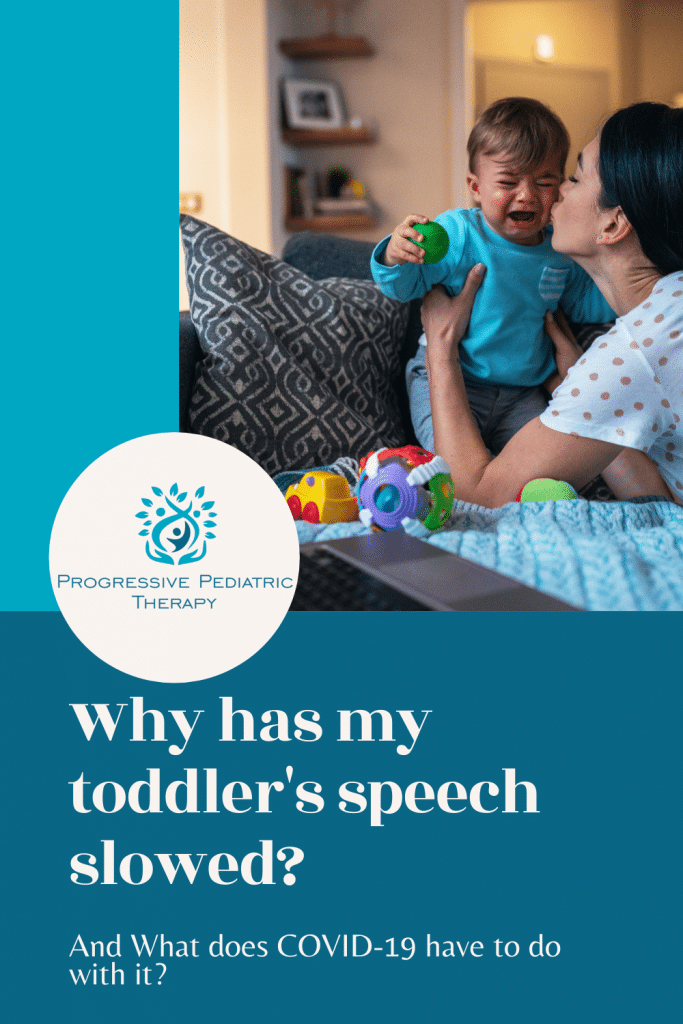Written By: Shira Danino, M.A, CCC-SLP
COVID 19 has presented us with lots of challenges; that’s no secret to anyone. What I’ve noticed in the last few months is an increase in referrals for children around 15-24 months old. Parents explain that their child was taken out of daycare and brought home during the shelter-in-place, brought home to 1 or 2 work-from-home parents, and suddenly whatever language they were showing started to slow down.
If you’re reading this and it hits home, I’d like to share a few important thoughts with you.

First of all, this is not your fault.
There are so many possible reasons for your child’s language to have slowed during this time. Could it have been the sudden change in routine, being pulled from daycare, staying home all day with maybe a little less structure? Absolutely. Is that your fault? Absolutely not. Rules were put in place, parents were forced to make a challenging decision, and every family had to decide what worked best for their situation. Some parents had no choice but to keep sending their child to daycare if they were essential workers. Other parents couldn’t stomach the thought of sending their child everyday with a possibility of contracting the virus, so they kept them home. No decision was wrong. Parents were thrown into an impossible situation and had to decide immediately what was best for them.

I can’t think of anyone living during this time who could claim that working from home with a little one, in a pandemic, with no playgrounds, with no play dates, with no family help, is easy. Read that again. It’s not easy. I’ve spoken to plenty of parents who have been embarrassed about the amount of screen time they gave their children while they had to teach from home, attend meetings from home, work from home, or whatever they had to get done. And it’s just that. We were in crisis mode and still had to raise children and make a living, while getting breakfast, lunch, dinner, and snacks on the table while the laundry was being washed and kids had to be bathed. My point is, we did what we had to do. We had no choice. Now, we move forward and intervene. But that’s all. Nobody is to blame.
Second, you are not alone. Your child is not the only child that has been impacted by this pandemic. Everyone has been impacted in some way, yes. Our littles have unfortunately been affected because suddenly they weren’t around as much language, they weren’t socializing with other kids, they didn’t have as many models for language as they used to before mid-March. Are you reading this and thinking, “yeah, but I sent my child back to daycare pretty early on, so their language shouldn’t have been affected.” Wrong. Here’s why.
Daycare providers are wearing masks. Is that safe? Yup. Do I appreciate it? Heck ya. But what we didn’t realize is the importance of infants and toddlers watching how sounds are made. Or the importance of babies seeing their caregivers smiling at them so they could smile back. So they could make connections with their providers. A daycare owner told me that when she helps out in the infant room, the babies don’t smile back at her because they can’t see her mouth when she smiles at them. How can they learn to say the /b/ or /m/ or /t/ sound if they can’t see how we’re making it ourselves? So much connection is lost with the mask.

I’m not advocating for a maskless COVID world, trust me.
But they are affecting our little ones’ development. And it’s very important that you know each additional factor that could be affecting your child’s development.
The last thing I want to write to you, dear parents, is that it’s never too late. Now is the time to give your child a nudge if you’ve noticed a plateau in his language skills. Our speech therapists can help and guide you in ways to help improve your child’s language development. Contact us to schedule an evaluation and we can help you get through this.


0 Comments